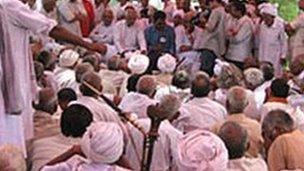Indian 'honour' killers should hang, Supreme Court says
- Published

Caste leaders expect communities to adhere to strict rules
India's Supreme Court says people convicted of so-called honour killings should face the death penalty.
"It is time to stamp out these barbaric, feudal practices which are a slur on our nation," the court said.
According to one recent study, hundreds of people are killed each year in India for falling in love or marrying against their families' wishes.
Convictions for "honour" killings usually carry life sentences. The death penalty is awarded only very rarely.
When executions are authorised they can be delayed for years on appeal.
'Gallows await'
Two Supreme Court judges issued Tuesday's ruling. They were dismissing an appeal against a life sentence by a man who had been convicted of strangling his daughter.
"All persons who are planning to perpetrate 'honour' killings should know that the gallows await them," said Justices Markandeya Katju and Gyan Sudha Mishra.
"He cannot take the law into his own hands by committing violence or giving threats of violence.
"In our opinion honour killings, for whatever reason, come within the category of rarest of rare cases deserving the death punishment."
Last month the Supreme Court warned states that they should "ruthlessly stamp out" so-called honour killings. It said senior officials who failed to act against offenders would be prosecuted.
Age-old notions of tradition and family honour are still deeply entrenched in many parts of Indian society.
Correspondents say there have been many recent cases in which people have been ostracised or killed for defying such notions.
Many victims anger their families by marrying outside their caste. Often "honour" crimes against them are endorsed, or even encouraged, by village-based caste councils.
- Published20 April 2011
- Published17 June 2010
- Published19 April 2011